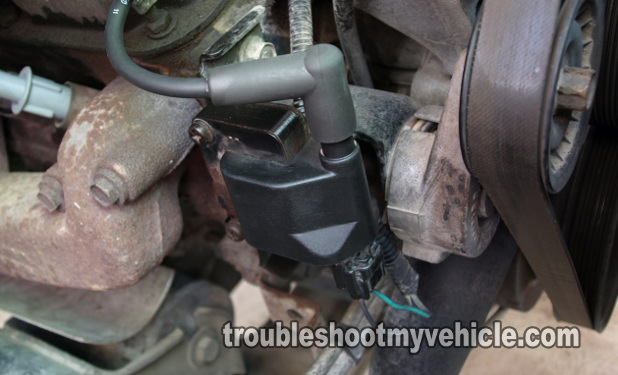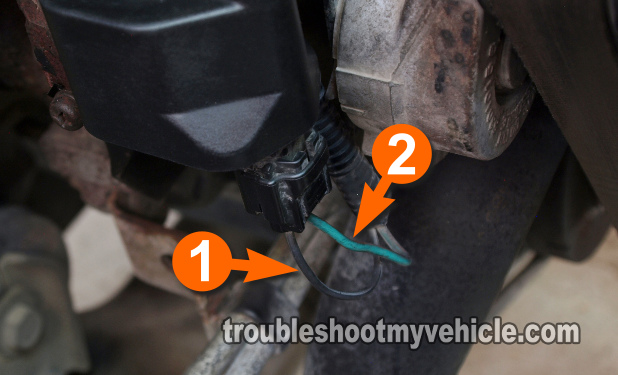
The ignition coil on your Dodge Ram Pick Up, Ram Van, Dakota with the 3.2L, 5.2L, or 5.9L engine can be easily tested on the vehicle.
You don't need any expensive testing equipment like a scan tool. Not only that, the test can be accomplished in 4 easy tests, the results of which will let you know if the ignition coil is truly fried or not.
The tools you'll need are a test light, a multimeter (optional) and a helper (to help you crank the engine). All of the tests are explained in detail and in plain English (no technical automotive jargon).
If you're looking for the resistance test of the primary and secondary circuits, this article won't help you (in my opinion, the primary/secondary resistance test is a complete waste of time and life that does not work around 99% of the time to diagnose a bad ignition coil).
Contents of this tutorial:
- Important Suggestions.
- Symptoms Of A Bad Ignition Coil.
- How Does The Ignition Coil Work?
- What Tools Do I Need To Test The Ignition Coil?
- Where To Buy The Ignition Coil And Save.
- IGNITION COIL TEST 1: Checking The High Tension Wire For Spark.
- IGNITION COIL TEST 2: Testing For Spark Directly On The Coil Tower.
- IGNITION COIL TEST 3: Making Sure The Ignition Coil Is Getting 12 Volts.
- IGNITION COIL TEST 4: Checking For The Presence Of The Activation Signal.
- More Dodge 3.9L, 5.2L, 5.9L Tutorials.
![]() You can find this tutorial in Spanish here: Cómo Probar La Bobina De Encendido (Dodge 3.9L, 5.2L, 5.9L) (at: autotecnico-online.com).
You can find this tutorial in Spanish here: Cómo Probar La Bobina De Encendido (Dodge 3.9L, 5.2L, 5.9L) (at: autotecnico-online.com).
TUTORIAL UPDATE INFORMATION
I've written a more up-to-date ignition coil test tutorial for the 1989-2003 5.2L and 5.9L V8 Dodge Ram 1500, 2500, and 3500 pickups. You can find them both here:
- How To Test The Ignition Coil (1989-1991 5.2L, 5.9L V8 Dodge Ram Pickup).
- How To Test The Ignition Coil (1992-2003 5.2L, 5.9L V8 Dodge Ram Pickup).
These tutorials have access to ignition system wiring diagrams.
Important Suggestions
TIP 1: Some of the tests, in this article, require that you perform them while cranking the engine. So it goes without saying: You've got to think safety all of time. Be careful, use common sense.
TIP 2: As a major safety precaution, keep your helper waiting outside the vehicle till you need him (or her) to crank the engine. Your helper should stay outside the vehicle and away from the ignition switch before you set up the test.
TIP 3: Quite a few things can cause your pick-up (van or SUV) to crank but not start. If you have already tested for spark and there IS spark from all 6 or 8 spark plugs (depending on whether you have a V6 or a V8), then the ignition coil IS NOT faulty.
If this is the case (in your case), the following article may be of help:
Symptoms Of A Bad Ignition Coil
The surest symptom that the ignition coil (on your Dodge pick up, van, or SUV) has failed is that your vehicle will crank but not start due to a lack of spark.
Here are some more specific symptoms of this no spark condition:
- You won't see spark firing from all of the spark plug wires.
- The fuel injectors will still work and spray fuel into the cylinders.
- The PCM will still activate the ignition coil.
- This means that the ignition coil does receive the switching signal but fails to fire spark.
- Crank sensor is good.
How Does The Ignition Coil Work?

The ignition coil is an amazingly simple device that is a key component of the ignition system on your Dodge pick up (or van or SUV).
The following is a very simple explanation of how it works that'll help you make sense of the tests I'll be showing you in the next pages.
It all starts when you turn the key and start cranking the engine, and in a nutshell, this is what happens:
- As the engine starts to crank, the crankshaft position sensor (on the transmission's bell housing) starts to generate it's crank signal.
- The PCM (Powertrain Control Module = fuel injection computer) gets the crank signal and then activates the ASD (Auto Shut Down) relay. Once this relay becomes activated, the ignition coil gets power (12 Volts).
The ignition coil only gets power with the engine cranking or engine running. - At the same time the PCM activates the ASD relay, it starts to switch the ignition coil ON and OFF by interrupting the ignition coil's primary voltage.
- Once the ignition coil gets this switching signal, it starts to spark away and as you're already aware, this spark gets delivered to the center of the distributor cap by a high tension wire.
- By this time, the fuel injection computer is also injecting fuel into the engine, which the spark will ignite, thus the engine starts!
The cool thing is that you can check to see if the ignition coil has failed (and thus causing your Dodge pickup, van, or SUV from starting) by checking for two very specific things: spark and the switching signal and in this tutorial I'll show how.
What Tools Do I Need To Test The Ignition Coil?
To test the ignition coil on your Dodge van or pickup, you'll need a few essential tools. Nothing that's gonna break the bank, just some basic diagnostic tools that'll ensure you'll be able to diagnose the issue accurately.
- Ignition spark tester: This tool is crucial for checking if there's a spark being generated by the ignition coil. It's the most accurate way to determine if the coil is functioning properly. This is the one I use and recommend:
- OTC 6589 Electronic Ignition Spark Tester (at: amazon.com)
- Spark plug wire pullers: This handy tool helps you remove the spark plug wires without causing any damage to their metal terminals. It's common for these terminals to get stuck on the spark plug, and pulling them off can be a hassle. Using pullers prevents this and makes your job easier.
- OEMTOOLS 25542 Spark Plug Pliers (at: amazon.com)
- Multimeter: You'll need a multimeter to measure the voltage the ignition coil is getting (10 to 12 Volts).
- Tekpower TP8268 AC/DC Auto/Manual Range Digital Multimeter (at: amazon.com).
- 12 Volt test light: This tool is used to test the presence of the ignition coil control signal. It'll help you verify if the coil is receiving the ON/OFF activation signal it needs to start sparking away.
- Lisle 28400 Heavy Duty 12 Volt Test Light (at: amazon.com).
The most important tool that you'll need is a spark tester. Any spark tester will do, but I'm gonna recommend a specific one that has been my go-to spark tester my entire automotive repair career. This particular one gives an accurate test result every single time and you don't need to interpret the color of the spark or make any adjustments to it: You can see it and buy it here: OTC 6589 Electronic Ignition Spark Tester (at: amazon.com).
Where To Buy The Ignition Coil And Save
The ignition coil and the spark plug wires are NOT expensive parts, especially if you shop for and buy it online.
The following links will help you comparison shop for the ignition coil and spark plug wires:
Not sure if the above ignition coil and spark plug wires fit your particular Dodge? Don't worry, once you get to the site they'll make sure it fits by asking you for the specifics of your Dodge. If they don't fit, they'll find you the right ones.
IGNITION COIL TEST 1: Checking The High Tension Wire For Spark

There's a good chance that you have already tested for spark (and you got no spark) or maybe you haven't done any tests at all. Either way, I recommend that you start here.
My test instructions call for using an HEI spark tester and you may be asking yourself if this is an absolute must and the answer is NO.
You can use any type of spark tester you want. The biggest reason I recommend the HEI spark tester is that it is a very, very accurate spark tester. You can see an example of this tool (and you can buy it here too): OTC 6589 Electronic Ignition Spark Tester (at: amazon.com).
The focus of this very first ignition coil test, is to see if the ignition coil high tension wire (the one that feeds the coil's spark to the distributor cap) is good or bad.
OK, this what you need to do:
- 1
Disconnect the ignition coil's high tension wire from the distributor cap.
IMPORTANT: Leave the other end of the high tension wire that connects to the ignition coil connected to the ignition coil. - 2
Connect the HEI spark tester to the high tension wire (see photo above).
- 3
Connect the HEI spark tester to the battery negative (-) terminal. You can easily accomplish this using a battery jump start cable.
- 4
When everything is set, have a helper crank the engine while you observe the spark tester from a safe distance.
- 5
The HEI spark tester will give you one of two results: spark or no spark.
OK, let's take a look at what your test results mean:
CASE 1: You got spark. This test result automatically tells you that the ignition coil and the wire are good. If there's spark, the ignition coil is not the cause of your Dodge's no-start no-spark condition.
If none of the spark plug wires (connected to the spark plugs) are sparking, with this result you can conclude that the distributor rotor is bad and is not distributing the spark the ignition coil is producing to the spark plugs.
Since quite a few things can cause a cranks but does not start condition, I recommend taking a look at the following tutorial:
CASE 2: You got NO spark. This test result doesn't condemn the ignition coil or the high tension wire just yet.
Then next step, in your ignition coil diagnostic, is to check for spark directly on the ignition coil's tower with the spark tester. So, to further pinpoint the problem, go to: IGNITION COIL TEST 2: Testing For Spark Directly On The Coil Tower.




